
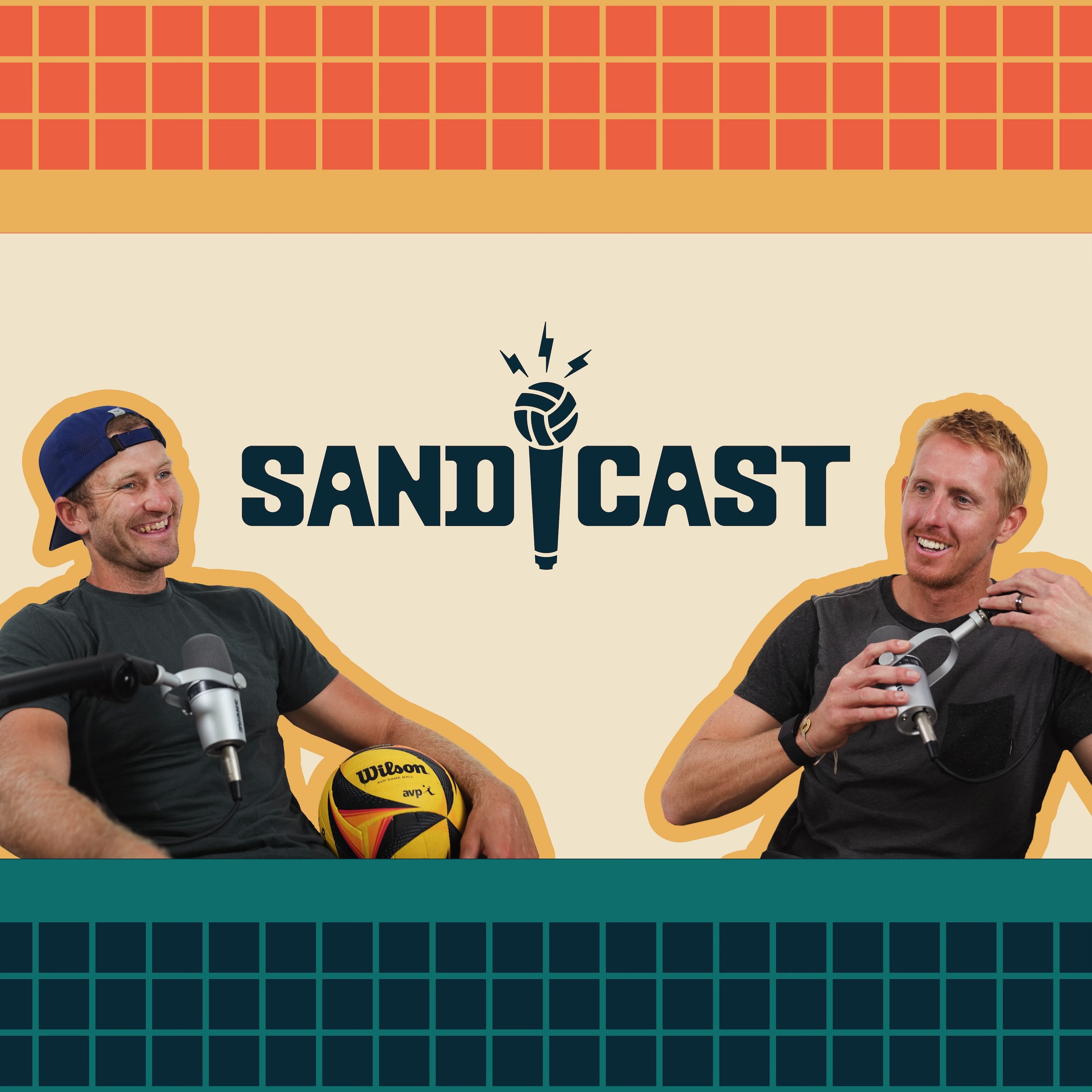
1.1M
Downloads
469
Episodes
SANDCAST is the first and leading beach volleyball podcast in the world. Hosts Tri Bourne and Travis Mewhirter take listeners into the world of the AVP, Volleyball World Beach Pro Tour and any other professional beach volleyball outlets, digging deep into the lives of the players both on and off the court as well as all of the top influencers in the game.
Episodes
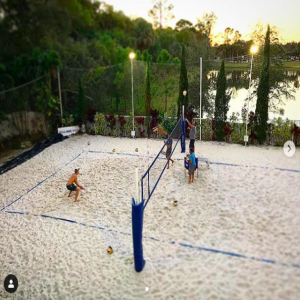
Wednesday Feb 20, 2019
FloridaCast: Phil Dalhausser and Nick Lucena are all in for Tokyo 2020
Wednesday Feb 20, 2019
Wednesday Feb 20, 2019
To be honest, the sound bye you’re looking for in this podcast comes around the three-minute mark. You can fast forward there if you’d like.
Tri Bourne, taking SANDCAST: Beach Volleyball with Tri Bourne and Travis Mewhirter on the road for a training camp in Florida, asks Phil Dalhausser and his coach, Jason Lochhead if they are all in for the upcoming quad.
“Yep.”
“Yep.”
Two words. All you need to know. Dalhausser and Nick Lucena are all in for the two-year push for the 2020 Tokyo Olympics.
Over the past few months, as it goes with beach volleyball, there has been no shortage of speculation in regards to the career plans of Dalhausser and Lucena. Rumors of retirement. Rumors of partner switching. Rumors of one final push.
All of those rumors, dispelled with a simple yep.
“It’s going to be quite a battle this time around,” said Bourne, who narrowly missed qualifying for the 2016 Olympics with John Hyden, edged out by Dalhausser and Lucena and Casey Patterson and Jake Gibb.
With Dalhausser and Lucena confirming they’re intentions for the upcoming Olympic race, a battle is exactly what it will be. Dalhausser and Lucena will be slotted as the unquestioned favorites, followed by Jake Gibb and Taylor Crabb and then a mess of three to six teams – Bourne and Trevor Crabb, Billy Allen and Stafford Slick, Reid Priddy and Theo Brunner, Ryan Doherty and John Hyden, Miles Evans and Billy Kolinske, Casey Patterson and Chase Budinger – all of whom could reasonably make an international push.
Which makes the preseason work all that more important. After the Fort Lauderdale Major was cancelled, Bourne and Crabb simply kept their tickets and decided to train with Dalhausser and Lucena, hence the Florida-based podcasts and a week of two-a-day practices and Brazilian BBQ with coach Jose Loiola and the girls team, Sara Hughes and Summer Ross, at night.
“Jose saw we had a big break after Fort Lauderdale got canceled so he wanted to get us out of California and switch it up,” Crabb said. “It’s a good idea. You get, over and over again practicing the same thing for two months straight in California is a little much. Especially when you get the opportunity to train against Phil and Nick, one of the best teams in the world, it’s good.”
Bourne and Crabb are still experimenting with their approach to an Olympic quad. They’re trying out a new system – split-blocking – new sides, new offenses, new everything. For Dalhausser and Lucena, who have a combined four Olympics between them, while Lucena had a narrow miss in 2012, this is nothing new.
“When I come in, it’s not like I tell you what to do,” said Lochhead, who coached Canada in the 2016 Olympic Games. “It’s, ‘We have three minds, let’s check out ideas and what things are going to be the best.’ It won’t work if I just come home and tell them what to do. They have a ton of experience. They know what’s going on. I always think, if you tell someone what to do, in their mind, it’s hard for them to really do it because they don’t truly believe it but if you talk it out with them and hear their thoughts and hear their ideas it almost becomes their idea and their thought then they truly believe it and go 100 percent at it.”
For one final Olympics, Dalhausser and Lucena are 100 percent in.
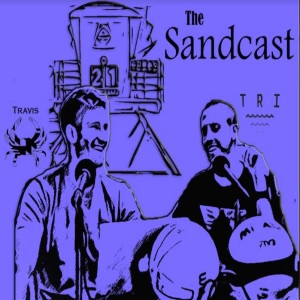
Wednesday Feb 13, 2019
Beach Volleyball stocks to buy prior to the 2019 season
Wednesday Feb 13, 2019
Wednesday Feb 13, 2019
Alas, we get our first look.
It was supposed to come this past week, in Fort Lauderdale, Fla., site of the late Fort Lauderdale Major. But with the plug pulled on the season-opening Major of the beach volleyball season, we were forced to wait.
For some, that wait ends this weekend, as four U.S. women’s teams, all new partnerships, will make the trip to Phnom Penh, Cambodia for a two-star FIVB. Typically, no, two-stars would not garner much attention, but the four pairs heading overseas are four of the more intriguing partnerships on the women’s side. While the men’s scene was turned upside down and shaken sideways, with all but two of the top teams breaking up, the women’s was relatively quiet.
Nearly all of the top teams remained together, while the mid-tier partnerships, the ones seeking breakthroughs, sought new partners to make that jump.
Four of those – Amanda Dowdy and Corinne Quiggle, Jessica Gaffney and Molly Turner, Brittany Hochevar and Carly Wopat, Caitlin Ledoux and Geena Urango – will be competing in Cambodia.
It made for a unique episode of SANDCAST: Beach Volleyball with Tri Bourne and Travis Mewhirter, one in which the hosts break down what individuals and teams are primed to make the biggest strides this year. Now, we left out the blue chips that are unquestionable, the Dalhaussers and Rosses, Klinemans and Hughes, because they’re already blue chips. Our focus was on the players and teams to make the biggest moves.
Here are the five best female and male beach volleyball stocks, either as individuals or team, to buy this year:
Men
Chase Budinger: It seems incredibly unappreciated, what Budinger was able to accomplish last season, his first on the AVP Tour. Not only was it his rookie year as a professional, it was the first time he had picked up a volleyball in a legitimately competitive arena since high school, and even then, it was indoor.
And in just one season, Budinger was able to make a final? Beat Evandro? Win Rookie of the Year?
With a full season under his belt, Budinger should be one of the biggest risers this year.
Tri Bourne, Trevor Crabb: Every time Bourne won a match last season – and he won many, including one over Phil Dalhausser and Nick Lucena and two over the Spanish, whom he had never beat – a large part of me wanted to remind people how absurd it was that he was winning. For a year and a half, he basically couldn’t sweat. And now he was beating the best team in the U.S. and another he had never beat with John Hyden playing defense? Bourne and Crabb were an excellent team even before either had learned how to play defense. Now that they’ve had Jose Loiola coaching them for an entire off-season, and Bourne is healthy enough to, you know, sweat, who knows how high they can climb this season.
Troy Field: The comparison I like to make with Troy, relative to the stock market, is Tesla. Here’s Tesla, a product of, honestly, genius. It has incredible upside, a potentially limitless ceiling. Sometimes it’s brilliant, and looks as if it could very well revolutionize the industry. Others, it busts. Anybody who has seen Field play has seen him make plays you simply can’t teach. It’s a rare type of athleticism that is going to win points, matches, attract partnerships (and sponsors). And then sometimes that athleticism gets a tad out of control, a bit like Elon Musk at Tesla, and he takes a few steps back. But he’s new to the game, and with two years of high level beach under his belt, a number of those odd mistakes should be smoothed out, and the ascent he’ll make this year will be quick.
Eric Zaun, Jeremy Casebeer: This is without a doubt the most interesting beach volleyball team in the United States, mostly because any team with Eric Zaun on it will be interesting, but what a dynamic. Here we have two bombers from the service line, who swing upwards of 80 percent of the time, who are a bit combustible in both good ways and bad. This is a team that could just as likely dump two straight matches and take 13th as win an entire tournament. Currently, they’re training in Brazil, against the best in the world, getting team-focused reps. I wouldn’t voluntarily bet against them.
Andrew Dentler, DR Vander Meer: It’s hard for me to lump these two together as a team, because qualifier teams are not exactly known for their longevity. But from what they’ve shown so far, this is going to be an excellent team. They’ve played in three AVP Nexts, winning one, placing second in another and fifth (I don’t know what happened there) in the next. Plus, Dentler, who was the unofficial adult of the year in 2018 – he got married, had a kid, finished his masters, bought a house – should have a little less on his plate to focus on volleyball.
Others to watch
Ben Vaught
Eric Beranek
Kacey Losik
Miles Partain
Logan Webber
Tim Brewster
John Schwengel
Ian Satterfield
Women
Brittany Howard, Kelly Reeves
Last year was really only the second year in which Howard’s focus was solely beach volleyball. She competed for Pepperdine in her grad year, and then she came out and won Rookie of the Year in 2018 on the AVP Tour. The vast majority of rookies in any sport come with no small measure of volatility, but Howard and Reeves were models of consistency, finishing in the top 10 in every AVP, including a third in San Francisco, while picking up a pair of bronze NORCECA medals and competing in four FIVBs.
Year two should be another step up.
Geena Urango, Caitlin Ledoux
When Urango made her SANDCAST debut, in December of 2017, she said that playing international volleyball wasn’t really a priority of hers. She loves to travel, just not to play volleyball. She enjoys actually enjoying the places she visits without the burden of competition.
Now, however, with Ledoux, it seems she’s reprioritizing, if just a bit. They went to Chetumal, Mexico for a three-star in October and made the finals. In the three prior tournaments they had played together, they made the finals (in San Francisco) and the semifinals (in Hermosa Beach) and claimed seventh at p1440 San Jose.
Carly Wopat
Wopat has known success at every level of beach volleyball – state champ in high school, All-American in college, National Team level afterwards. Now she’s on the beach, already scooped up by one of the most consistent defenders in the game in Brittany Hochevar. With her focus entirely on the sand, Wopat should be expected to make big moves in 2019.
Kerri Walsh Jennings, Brooke Sweat
Remember when it was December of 2017, and Tiger Woods was the 1,199th ranked golfer in the world? And by August of 2018 he was back in the top 25? That’s a little bit of what 2019 could be for Walsh Jennings and Sweat.
Not that Walsh Jennings could have ever fallen that far in the sport, but it’s still a parallel of one of the greats in the game being sidelined for a bit and now making one final push. At no point would it be wise to count out Walsh Jennings, especially since she’s playing with perhaps one of the more underrated players of this generation in Sweat, who has won with essentially everyone she’s played with.
Kelly Claes, Sarah Sponcil
Classic case of the rivals turned teammates, who put on a delightful run through The Hague, winning a silver medal, which will pair nicely with a bronze from their debut tournament in Qinzhou, China, in October. This is a team that could very well supplant the top teams in the U.S. in spite of the fact that Sponcil is still competing for UCLA.
Others to watch
Corinne Quiggle, Amanda Dowdy
Delaney Knudsen, Jessica Sykora
Molly Turner, Jessica Gaffney
Allie Wheeler
Nicolette Martin
Falyn Fanoimoana
Emily Hartong, Alexa Strange
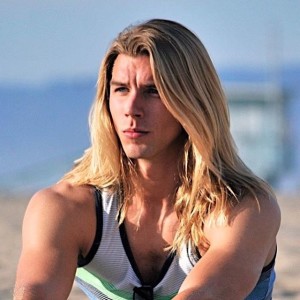
Wednesday Nov 28, 2018
Stafford Slick: Beach volleyball's Viking duck hunter
Wednesday Nov 28, 2018
Wednesday Nov 28, 2018
As if his path to beach volleyball wasn’t unique enough – raised in Minnesota, little to no volleyball background aside from a little club indoor, not a clue who men named Todd Rogers and Phil Dalhausser were – in his nine-year career thus far, Stafford Slick may have authored his own personal record book.
Name another who has played with six different Olympians, including three gold medalists. Or anyone crazy enough to play in 17 – 17! – different NORCECAs with eight different partners.
“We might have to do some fact checking,” Slick said on SANDCAST: Beach Volleyball with Tri Bourne and Travis Mewhirter. “But I think I’ve played with more Olympians than anyone else. I played with Dain [Blanton], retired him, put him out to pasture. I played with Rogie [Todd Rogers] in his last event, so I retired him. I played with Rosie [Sean Rosenthal], I played with Casey [Patterson], I played with Adrian [Carambula], who wasn’t an Olympian at the time, but he is now. And then I played with Reid Priddy. That’s another thing I might have a record for: I have a lot of partners too.”
For an individual who has been playing beach volleyball for a hair over nine years, indeed, Slick has gone through his fair share of partners, though that’s less a detractor from his talent than it is an indicator of it. It’s only so often you get a coordinated, athletic, hand-setting 6-foot-8 blocker out of Minnesota.
“I guess those guys saw something in me,” Slick said. And of all people, it was Blanton, a gold medalist, who saw it first.
Slick was in his cabin in Minnesota for a July 4 getaway in 2010 when he got the call: Blanton, a gold medalist alongside Eric Fonoimoana in the 2000 Sydney Games, wanted to give Slick a shot. They’d be automatically in the main draw, Slick’s first. He wouldn’t even have to qualify.
“It was huge for me,” Slick said. “Dain was kinda poking around, looking for a big man to play with because it was the tenth anniversary of his gold medal. So he was kind of connected with some of the people in the USA office and they dropped my name.”
And just like that, Slick had his first of many accomplished partners. And yet, funnily enough, his unofficial Olympic partnership record may have never happened without his willingness to play in his unofficial record number of NORCECAs that, frankly, borderlines on absurd.
“I don’t think that would happened without me playing all those NORCECAs,” he said. Because about those NORCECAs: They were on a lower international tier than they are now. When Slick moved to California in 2009, NORCECAs didn’t count for international points. The prize money, even if you won, wouldn’t cover the expenses for the majority of the tournaments. The incentive for American teams was, well, what was the incentive?
In Slick’s case, to put your name on the map.
“In 2009 and 2010, it was trying to scrounge and figure out a way to keep playing, and at the time, NORCECAs didn’t count for international points, so it was just sign up,” Slick said. “Back when I started playing it was ‘Hey can we play in this tournament?’ and they said ‘Great!’”
So he did. He played with Mark Burik and Billy Allen, Even Engle and Will Montgomery, John Mayer and Casey Jennings, Priddy and Marcin Jagoda. Seventeen of them.
Enough to get Slick on the map. Enough to get him a partnership with a gold medalist in just his second year attempting to qualify. Enough to kickstart a career that, two years from now, could turn Slick into an Olympian himself.
Indeed, he has come a long way from the guy with the blonde Viking locks who didn’t know who Todd Rogers and Phil Dalhausser were. Back with Allen, with whom he won his first AVP tournament, Slick is no underdog to make Tokyo, should that be their goal.
"When it came time to make that decision, it was something that just fit," he said. "It was something that just made sense. That was a big part of our conversation was 'Do our goals align? Are we making a run for Tokyo?' I"m excited. I'm hopeful."
Popular on SANDCAST:
SANDCAST: Eric Zaun, the Happy Gilmore of the AVP Tour
SANDCAST: Taylor Crabb, AVP Seattle champion
SANDCAST: Sarah Sponcil, Pac-12 Champ, National Champ, AVP Finalist
SANDCAST: Jake Gibb ain't finished playing yet!
SANDCAST: Tri Bourne is BACK ON THE BEACH
Train like the pros, with the pros, at VolleyCamp Hermosa!
Recover the right way with Firefly: Accelerated Athletic Recovery
Choose the ball the pros use. Choose Wilson and use our discount code: WILSONSAND FOR 20 PERCENT OFF!
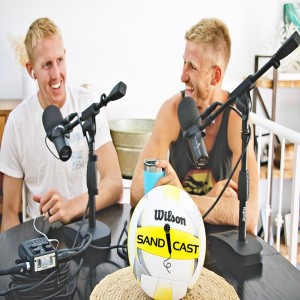
Wednesday Nov 14, 2018
SANDCAST anniversary episode: We made it!
Wednesday Nov 14, 2018
Wednesday Nov 14, 2018
It was funny, what kept happening over the course over the year, a comical little motif that never failed to boggle my mind.
People would thank me.
They thanked me in Austin. To the great amusement and bafflement of my parents, they thanked me in New York. They thanked me in San Francisco. One person went as far as to ask for my autograph in Seattle. Mark Schuermann thanked me during my introduction on my stadium court match in Hermosa. A few lovely Georgians expressed their gratitude in Chicago.
Not for playing, mind you. No, for speaking. No, that’s not quite right, either. For asking questions, and then taking the audio answers of those questions from very accomplished individuals and putting them on iTunes, where people can then listen to them in podcast form.
They thanked me for SANDCAST: Beach Volleyball with Tri Bourne and Travis Mewhirter, which as of a few weeks ago hit its one-year anniversary.
These thanks have always been curious to me.
Thank me?
No, no. Thank Tri Bourne.
The podcast was his idea, anyway. We initially met over the phone, the first interview I conducted for a book I’ve been working on that’s set to release this December. Then we met in person at the Manhattan Beach Open, where we did the livestream together. He loved it. I loved it, mostly because I got to talk to Tri Bourne – Tri Bourne! THE Tri Bourne! Ranked top-10 in the world Tri Bourne!
He liked the give and take we had, with his deep knowledge of how to play the game and its various nuances and my geeky knowledge of the game and an abnormal capacity for random and mostly useless numbers on BVBinfo. So we met at the Ocean Diner a month later and hashed out some ideas. He needed something to do while he was recovering from an autoimmune disease. I was the only beach volleyball writer or media member or whatever it is you’d like to call me that he knew.
He thought we’d make a good team.
Turns out, he was right, the first of many times he has steered us in the correct direction.
Thank me?
No, no, thank the players.
They’re the ones who voluntarily – though sometimes coaxed with wine and podsnacks – give up the two most precious things in life, the ones you cannot get back: time and stories. April Ross gave up two-plus hours despite a schedule I cannot begin to describe in terms of busyness. Same with Phil Dalhausser.
Two of the most successful players in the history of beach volleyball volunteered a good chunk of their time for no other reason than because – well, I don’t really know why. But they’re two of the most popular episodes we’ve done, despite being so early in our podcasting journey.
Ah, yes, the start of the podcast. For that, you can thank VolleyballMag, and the editor, Lee Feinswog, who oversees all of the stories that accompany the episodes. He’s the one who landed our initial sponsor, Marriott Vacation Club Rentals, which fronted the money for all of our equipment. It kept us from, at any point, going in the red.
We launched a project without a single investment from our end.
Thank me?
No, thank the sponsors who have continued to climb aboard to keep the show running. Thank Firefly Recovery and Wilson. Thank Pacific Coast Wealth Management and VolleyCamp OC.
Thank the anonymous donor who funded our pet project, the SANDCAST Wildcard.
Tri and I had been looking for a way to truly help grow the game. So often we were thanked for the work we were doing, but what were we really doing? We were providing a platform, dispensing information, sure, but nothing to really help the players.
We came up with the idea of a wildcard, a way to fund qualifier players to their next tournament, to remove the sting of the $500 plane ticket and $100 entry fee to maybe, maybe, make $1,000 in main draw.
Only, we didn’t have the funding. Until we did. An email from a fan of the show, looking to help. And help he did, giving us the cash we needed to help 14 teams get to their next tournaments. A project that cost well into five figures, one that we didn’t fund on our own.
And we got the credit?
Nah, don’t thank me. Thank that guy (except he’s chosen to remain anonymous, so thank him mentally or something).
We have not been a perfect show. We’ve had our fair share of mishaps and audio bungles, and for that, we thank you for your patience. I accidentally deleted what is quite possibly the best interview I’ve ever done in 11 years as a journalist.
Thank me? Nah, thank Ed Ratledge, who delivered that perfect, perfect interview, and is willing to do another, despite my bungling of his first.
We’re figuring this thing out, Tri and I. Our first few shows were clumsy at times, mostly because I used to loathe interviews with multiple interviewers. I typically have topics and paths I’d like to steer the interviews towards, which is why I hate press conferences and other multi-interviewer formats. Tri would want it to go one way, I’d take it another. It took a minute for us to develop a working rapport, a type of silent communication where I could feel when he was ready to go and vice versa.
And while we’re on Tri, I’ll say this: He is without a doubt the most invaluable aspect to the show. You want to know why April and Phil and Taylor Crabb, three typically reserved athletes, were suddenly so open, so vulnerable, so phenomenal on the mic? Because Tri was there. He bridges the gap between the athletes and the, ahem, dreaded journalist – me – in the room. He keeps it conversational.
If the podcast is a road trip, I’m simply the GPS. I get us where we need to go. Tri is in the passenger seat deejaying and divvying out snacks (he literally divvies out snacks, too). He keeps it fun, casual, conversational.
So no, there is little need to thank me. I’m simply hanging on for the spectacular ride this podcast has taken me on this past year, and hopefully will continue to run for years to come.
I appreciate your thanks and gratitude. I really do. It’s fun, and I hope listeners continue to approach me in future events. I love talking to y’all, to hear your feedback, to get your insight.
Thank me?
Nah. You’re the listeners. You’re the ones who make the show worth making.
So thank yourselves.
Tri and I are beyond thankful for you.
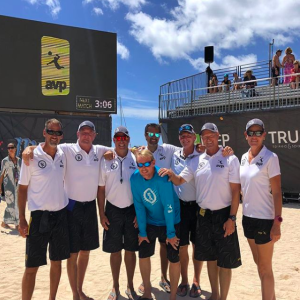
Wednesday Oct 10, 2018
Refs are people too! With John Rodriguez
Wednesday Oct 10, 2018
Wednesday Oct 10, 2018
Nick Lucena winked, and only one person in the stadium could have possibly seen it: head ref John Rodriguez.
Lucena had always been known for his fiery demeanor, and though Rodriguez cannot recall the exact year of the wink, he estimates it came at a tournament in Florida, when Lucena and Phil Dalhausser were playing Matt Olson and Kevin Wong, which would date it to the mid-2000s, which also dates it to when Lucena’s temper was nearing its zenith.
Or was that temper just theatrics? Something for the crowd to enjoy, an added element to an excellent match between one storied team and the next great one?
Perhaps, as it goes sometimes, it’s a bit of both.
“Phil [Dalhausser] chucked a set,” recalled Rodriguez, one of the most well-known and well-respected refs on the AVP Tour and p1440. “Which is rare but it happened, and I tweeted it. Nick [Lucena] comes – they were getting killed in the second set against Kevin [Wong] and Matty [Olson] – flying over to my stand.”
And here is where the disconnect between crowd and players and refs begins, in that intimate space between ref stand and player, where only two individuals know what’s being said in the conversation.
“He goes ‘John, give me a yellow card, I’ve gotta get fired up,’” Rodriguez, said, laughing. “And he’s flailing his arms at me, and I’m like ‘Oh, alright, this isn’t so bad.’ And he says ‘Play along with me’ and I’m pointing at him and he’s pointing at me, and we’re not going overboard with it, but he says ‘Give me one more second and then give me a yellow card.’ So I said ‘Just don’t slam my stand or hit anything because then I have to give you a red card.’
“So he goes around a little bit longer and finally I tweet, give him a yellow card, and the audience goes ‘Booooo!’ And Nick’s pointing back at me and then he winks at me. It was just a fun time.”
Ah, yes, few on top of the stand, or maybe even in the entire game, players included, have as much fun as Rodriguez, this week’s guest on SANDCAST: Beach Volleyball with Tri Bourne and Travis Mewhirter.
The paths for a male to become a professional beach volleyball player are few and far between, no two the same. The paths for a male to become a professional beach volleyball referee are even more circuitous.
“We do not,” Rodriguez said repeatedly, “do this for the money. We do this because we love the game.”
Rest assured, Rodriguez does not, or initially did not, get into the game for the money. For the first handful of years in which he was involved in the game, he was a volunteer, a 20-something-year-old ball shagger.
“The opportunity as an adult ball shagger, I’m like this older guy amidst all these kids chasing balls next to me and just loving it, loving the game, getting to play afterwards on the pro courts,” Rodriguez said.
He shagged balls for so many years, in fact, that the AVP finally shrugged its shoulders and figured why not get the guy involved in a few more capacities? Maybe put him in the information booth, chat with the VIPs? After a few more years of that, the head ref at the time approached him and said “Hey, I know you know the game, and you’re already traveling with the AVP, so I know you could save me a lot of money if I could just use you for one day, maybe two days if we use you as an official,” Rodriguez recalled. “’So I said ‘Yeah, sure, that’ll be cool.’”
He worked Thursdays and Fridays as a ref, and when the bigger matches began, the more established refs were called in and Rodriguez, known affectionately as J-Rod among players and fans alike, would return to the information booths or wherever his talents and passion were needed.
Soon enough, Rodriguez could no longer be found in information booths or with the VIPs. No, John Rodriguez was a ref, from Qualifier Thursday to Finals Sunday, culminating in his Twitter handle becoming @avpjrod.
“I had no idea it would go on this path,” he said. “I’m loving it. And we do this because we love the sport. I think I’ve said that, sorry, but we enjoy what we do, and I think it shows from, all of us, sometimes we’re at the site from 6:30 to 7, whatever it is. It is a long day, but when we look back, and the day closes, we’re like ‘Hey, that was a great day! We had the best seats in the house, or standing, whatever it may be, we saw some amazing volleyball, and it’s all worth it.’ The fatigue seems to go away and you wake up in the morning, get on your horse, and do the same thing again. We really love it.”
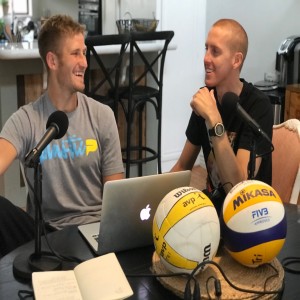
Wednesday Sep 19, 2018
SANDCAST roundtable: 'Play in as many tournaments as you can'
Wednesday Sep 19, 2018
Wednesday Sep 19, 2018
It became a recurring motif, though not exactly a conspicuous one. If you’re a regular listener to SANDCAST: Beach Volleyball with Tri Bourne and Travis Mewhirter, you’ll know that our final question to our guests is some iteration of: “If you had to give an up-and-coming beach volleyball player one piece of advice, what would that piece of advice be?”
Some might expect a secret drill, a certain lift in the weight room, that one key to unlocking their potential, the secret formula to why Taylor Crabb always seems to be in the right place, at the right time, all the time (just watch the Manhattan Beach Open final and you’ll understand).
The most common bit of advice, however, is as simple: Just play. This week, with Bourne home in Hawai'i and me in Maryland for an emergency trip home, we had to cancel the podcast, so we gathered advice from four of the best in the game -- Taylor Crabb, Rafu Rodriguez, Nicolette Martin, Katie Spieler -- on how, exactly, they became the best in the game.
“Be a student of the game,” said Crabb, a likely candidate to win at least one of Most Valuable Player, Most Improved Player and Best Defender on the AVP Tour this season. “Be smarter rather than stronger, faster, bigger. It’s more important than the other things. Learnt he game, learn why things work, learn why things don’t work. The more you play, that’s when you get bigger, faster, stronger, going on the beach, just playing every day, you’ll train those muscles naturally. The gym does help also but the IQ of the game is the most important thing.”
This season was, incredibly, only Crabb’s third on the beach. Just as he did in 2017, he enjoyed a career year in 2018, winning a pair of AVPs in Seattle and Chicago as well as claiming King of the Court in Hawai’i. His theory, too, was supported by three other SANDCAST guests – Spieler, Rodriguez, Martin – who all, not so coincidentally, enjoyed career-highs.
“Just keep – just play every day,” said Martin, who claimed fifths in Austin and Seattle, narrowly missing her first Sunday. “We were talking about playing too much or whatever, but if you’re up and coming, I think it’s super important to get out to all those CBVAs on the weekend and just be playing as much as you can because it’s such an experience sport for sure. Just as much as you can touch a ball, the contacts, make sure when you’re going to the beach, get [phone] numbers, talk to people, that’s huge.”
It has been for Martin, just as it has been for Spieler, a 5-foot-5 dynamo out of Hawai’i who made her first career Sunday in Austin, where her and Karissa Cook finished third. The founder and coach at East Beach Volleyball Academy, Spieler tells her girls to do exactly what she does over the summer: “Get out there and play as much as possible,” she said. “Growing up at East Beach, I would just go down and play with older guys or pickup games all day on the weekends and I think that’s when I really learned that I, a) loved the sport, and b) just a lot of different ways to score. So I don’t think you necessarily need to play for a club, even though that’s great if you have the resources to do so. Just that we are able to go down to the beach, grab a ball, maybe pick up a player and get better is great. So just get out there.”
Rodriguez, the final guest on the SANDCAST radio hour of sorts, emphasized tournaments and pickup as well. He’s no stranger to CBVAs and AVP Nexts, despite winning an AVP in San Francisco this season, his first career AVP win.
“Just go out and play in as many tournaments as you can,” he said. “Learn the game playing the game, right? Even me, I go out and play in CBVAs and all those one-day tournaments because you got to go out and play. Yeah, you have to train and learn the techniques, but you need to go out and play and play and play and play.”
Popular on SANDCAST:
SANDCAST: Melissa Humana-Paredes and Sarah Pavan
SANDCAST: Taylor Crabb, AVP Seattle champion
SANDCAST: Sarah Sponcil, Pac-12 Champ, National Champ, AVP Finalist
SANDCAST: Tim Bomgren, the Minnesotan who could
SANDCAST: Netherlands’ Brouwer and Meeuwsen go for gold or bust
Train like the pros, with the pros, at VolleyCamp Hermosa!
Recover the right way with Firefly: Accelerated Athletic Recovery
Choose the ball the pros use. Choose Wilson and use our discount code: WILSONSAND FOR 20 PERCENT OFF!
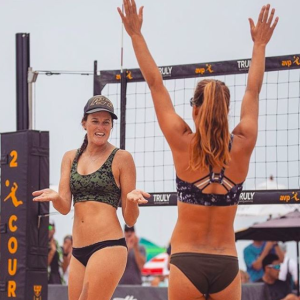
Wednesday Sep 12, 2018
Karissa Cook: Old fart, hood rat, awesomely effective volleyball
Wednesday Sep 12, 2018
Wednesday Sep 12, 2018
Call it old fart volleyball. Call it hood rat volleyball. Call it dirty or creative or funny or crafty or whimsical or whatever other name you’d like to label Karissa Cook’s decidedly awesome style of scoring points on a volleyball court. But you must, at the very least, call it this: effective.
Effective enough that Cook and her partner, Katie Spieler, scored an invite to the AVP’s final event of the year, an invitational in Hawaii, where Spieler and Cook played their college ball.
Effective enough to make her first career Sunday, at the AVP’s opening stop in Austin. Effective enough to avoid the qualifiers all year – “I had to do some beautiful mind calculations for New York,” she said, laughing – for the first time of her young career.
“If it ain’t broke don’t fix it,” she said of her partnership with Spieler, last week’s guest on SANDCAST: Beach Volleyball with Tri Bourne and Travis Mewhirter. “We’ve just been playing together and the honeymoon phase hasn’t worn off two years later.”
And Spieler’s contagious energy continues to rub off on Cook. After Chicago, where they finished seventh, Cook was about ready to shut it down. Time for rest and recovery. Off-season things. But the season wasn’t over. Not yet. There was a NORCECA qualifier to play, and an energetic – always energetic – and enthusiastic – always enthusiastic – partner who wanted to play.
“I was like an angry cat,” Cook said, laughing. “We had played so many tournaments but we had so much fun, per usual. I 100 percent always love volleyball as soon as my feet touch the sand. You go and it’s the best decision you’ve ever made.”
Seems so. Cook and Spieler breezed through the qualifier, and now they have few events on their 2018 schedule, to go along with the unexpected invite to Hawaii.
“Katie was like ‘Let’s do it!’” Cook said laughing. “And I was like ‘Ok, fine.’ I just grom onto her and make her carry me with her wherever we go.”
It appears that really isn’t too far from the case. Earlier this year, Spieler made the move from Santa Barbara to Hermosa Beach, cutting down on an obscene amount of drive time, able to get in with the top training groups in the country. Cook recently did the same, leaving her post as a Stanford beach coach, moving from Palo Alto to Manhattan Beach.
Of course, some things are a bit different between the two as well. Cook is also moving to be closer with her brother, Brian, the hilarious and viral star of Instagram this season, with whom she’s helping found a start-up, a sort of “Uber for bartenders,” she said.
Stanford kids.
But mostly, she knows that, while beach volleyball is friendly to the body, she cannot play forever. Her window as an elite athlete is narrowing over the next five to 10 years. Coaching will be there forever. Gromming onto Spieler, qualifying to play events in countries she’d otherwise never visit, is here now.
“I could have stayed there and been a padawan forever and been super happy,” Cook said of Stanford. “I adored [coaching] and I loved it and I’ll always be super grateful for it, and I do see myself going back and coaching but I wanted to really go for it for a couple years at least.”
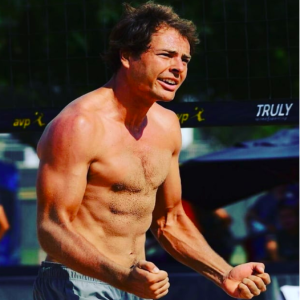
Wednesday Aug 29, 2018
Eric Zaun: The Happy Gilmore of the AVP Tour
Wednesday Aug 29, 2018
Wednesday Aug 29, 2018
The first thing you must know about Eric Zaun is that you cannot call him Eric Zaun. Don’t laugh. He’s serious. Maybe. Sort of. Well, you never can know with Zaun.
“I’ve actually been going by Danny Fahrenheit lately,” Zaun said on SANDCAST: Beach Volleyball with Tri Bourne and Travis Mewhirter. “You introduced me as Zaun but I like Danny Fahrenheit. I just don’t like the name Eric.”
If you know Zaun, nothing about this is surprising. If you do not know Zaun, the 37 words above are an apt summation of what it’s like to be around Eric Zaun, or Fahrenheit, or whatever it is you’d like to call him. He’ll take anything but Eric at this point.
“[Piotr Marciniak] actually calls me Cookie,” Zaun said. “I used to go by Cookie Robinson exclusively on the NVL. Everybody called me that. A lot of my good friends still call me that.”
So his current partner calls him Cookie, he occasionally moonlights as Danny Fahrenheit, though he’s also immensely proud of tricking a reporter covering Pottstown that his name was Lamb Rivermore. When the paper ran the next morning, and Zaun was quoted under that alias, he finished the weekend known as Mr. Rivermore, Lamb Rivermore.
“They wrote that in the newspaper!” he said, laughing.
Just Zaun being Zaun…or Fahrenheit or Cookie or Reebok Hernandez or Lamb Rivermore, whatever you want to call him.
But don’t let him fool you, either. There’s more to Zaun than he lets on. Much more.
One does not simply earn the AVP Rookie of the Year by chance. Nor does one make a Sunday in his first season on Tour, and in the next, win Waupaca, Seaside and six-man – the biggest non-AVP domestic stops of the year – without putting in the work to do so.
Zaun puts in his work. Plenty, actually. This is a season that began with a two-month trek through New Zealand and Australia, in which he and Adam Roberts won a handful of tournaments in New Zealand before claiming fifth in an FIVB in Shepparton, his second career international tournament.
“That takes a lot out of your off-season training,” Zaun said. So he just kept going. To Iran, Aguascalientes, China, Austin, Wisconsin, Oregon, Dallas,
“Just getting used to the grind,” he said. “I got a lot more FIVB points, compared to zero at this time last year.”
The points are nice, yes, but Zaun isn’t much for material things, even if it concerns his career. Ed Ratledge still has his Rookie of the Year plaque. He once took off an FIVB jersey and handed it to a ball girl. An oversized check from Seaside? Gave it to a random kid, just because. The only prize he’s ever kept from volleyball is the money he’s made, which really just funds the next one, and the next one, piling up experience after experience.
That’s what he’s after, anyway. Experiences. Stories. Perspective.
“It’s really unfortunate that we can go to all these places but we don’t really have any time for fun,” he said. “It’s almost brutal, mentally, these new places I’ve never been before, I have to fly right back for an AVP. But it’s cool because even though you’re going to China or Iran or the middle of nowhere Mexico, it’s not like a total loss because a lot of people never get to see that and see how they live.
“You really take for granted how great your life is in America. Even if you didn’t get to do anything in Iran, you still got to see another place in the world. You’re not even allowed to go to Iran! America’s pretty great. You realize that once you travel.”
Though the volleyball season will be over after this weekend, Zaun’s travels have just begun. As soon as the final ball hits the sand in Chicago, he’s off to South America, on what promises to be nothing shy of a winding, epic, story-filled “road trip with the boys.”
A morale-booster.
He’s the first to admit that his second season on tour was “a bit of a sophomore slump,” he said. But he’s learned. He’s dabbling on the right side, expanding his skill set. He’s recognized that his defense is still lacking, that his weight can’t fluctuate as much as it has over the course of his career.
“I don’t think I’m that great of a defender,” he said. “Just kind of overall everything – digging hard driven balls, staying balanced. I don’t have a volleyball background. I started playing beach volleyball late so it’s not like I have all those fundamentals drilled into me. I just don’t think I have that many touches or reps or coaching.”
So he’s going to get into film. He’s going to get more touches.
But first, he’s taking a road trip with the boys.
For Danny Fahrenheit to play to the best of his abilities, morale needs to be high.
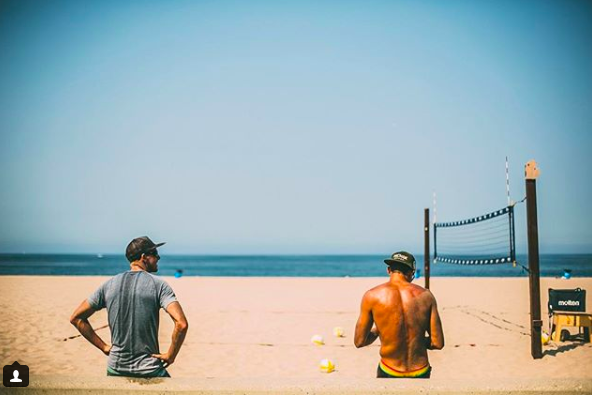
Wednesday Aug 15, 2018
Tri Bourne is BACK ON THE BEACH
Wednesday Aug 15, 2018
Wednesday Aug 15, 2018
Phil Dalhausser stands, hands on his hips, shaking his head.
“That,” he says, “looks so boring.”
He’s watching a young man play volleyball by himself, tossing a ball, hitting it line, tossing another, hitting a cut, tossing another, hitting a high angle. Over and over and over, nearly two hours on end.
Many of the passerby on the Manhattan Beach Pier that day could have reasonably concluded one of a few things: the guy was either bored, as Dalhausser suggested, had no friends to play with, or was just borderline crazy.
There was, however, a fourth option.
Tri Bourne was actually having the time of his life.
Weeks later, Bourne is in Bear Valley, California. He skipped out of AVP San Francisco early. It’s tough to be around the sport you once dominated, watching others who had never beaten you win titles you’re sure would be yours for the taking. So he’s visiting his sister, Kai, and his nieces and nephew instead.
They’re barefoot minions, those three, ages two, four and six, charging around the forest, biking down hills, rumbling through creeks and swimming in the lake nearby. It’s suggested that they’re already addicted to exercise, and it’s also pointed out that it’s not the worst addiction to have.
Bourne purses his lips, looks down.
“It is,” he says, “when the one thing you can’t do, is exercise.”
***
This is not a comeback story. No, no. That’s not how Bourne views it, and it’s not how he’d like you to view it, either. This is a reinvention, a rebirth, though not of the holy sort. Tri Bourne isn’t returning to the AVP Tour, to beach volleyball, the same person he was when he and John Hyden finished second in the world rankings in 2016.
He’s coming back as Tri Bourne 2.0. More well-rounded. A different person with a different perspective. A mindset that goes far deeper than pass, set, hit. A skill set that is relevant east of the Pacific Coast Highway, too.
Weeks before the onset of the 2017 season, Bourne and Hyden were registered to play the Fort Lauderdale Major. Bourne was still on the heels of ankle surgery, but all seemed fine. His mobility was good enough, jump felt no different, cardio was up to his world-class standard.
Except there was something going on with his hands. He’d block a ball and his hands would sting and throb, eventually swelling to the point that he wore mitts at practice. He thought it was carpal tunnel syndrome, where the hands experience tingling and numbness from a pinched nerve.
He got it checked out. The doctors didn’t know what it was, just that it was not carpal tunnel. Neither did the next doctors. Nor the next. It wouldn’t be until Bourne went to the University of Utah, site of the United States Olympic Committee’s medical center, that he would receive a diagnosis.
It wasn’t carpal tunnel syndrome, the doctors confirmed. It was an autoimmune disease, something called myositis, which means, generally speaking, inflammation of the muscles that you use to move your body.
It means Kryptnonite to the boy who grew up paddling, surfing, canoeing, playing volleyball, basketball, hiking – “just charging,” as he would put it.
The boy whose life was, to that point, based on movement, was no longer allowed to move.
“Basically,” he said, “I just had to shut it down.”
Friends began to see changes in him. He wasn’t quite the same. Something was off. Because of course something was off. Bourne’s entire life, entire existence, had been flipped upside down and inside out.
“You know when it’s raining and you have to sit in the house all day?” he said. “Yeah, that was me, every day. It was basically that. That’s what it was like. Everyone who knows me knows I’m pretty damn ADD. I come from a family that’s pretty much addicted to working out, that’s definitely a thing. Yeah, man, it’s intense. That’s why I had to go internal with everything because it was a lot, it was getting to be too much. It was, uh, it sucked. It sucked for a while, because I still had that drive, coming out of the Olympic qualifier, and my ego was just huge, I was ready to be the top guy in the U.S.
“I was still ready to work hard, but what could I do? It was ‘Do nothing.’”
He couldn’t surf, so he would body-surf occasionally, until his heart rate went too high and he’d have to sit back down. He couldn’t play volleyball, and watching film was almost as tortuous as blocking with the mitts. He couldn’t eat, well, anything. Anything that could potentially inflame his muscles – dairy, gluten, alcohol, just about everything not named broccoli, rice, and organic chicken breasts – was removed from his diet. The snacks in his pantry shifted spectacularly, from chips and salsa to dry-roasted peanuts and pumpkin seeds. His weight plummeted, nearly going south of 170 pounds.
“It was definitely one of the tougher things to see someone go through,” Trevor Crabb, Bourne’s partner for AVP Manhattan, said. “You can’t imagine missing out on a whole year and a half of your job and your love. Seeing him last year, when it first started, basically his muscles in his arms were as skinny as my legs. It was crazy just to see how his body changed so drastically.”
It was, for an athlete who had competed in 13 different countries in a single year and took a bronze at the World Tour Finals, rock bottom.
But that’s the thing about rock bottom.
The only direction you can go is up.
***
It began with the livestream. The AVP was expanding its coverage to Facebook live on stadium court. Bourne was asked if he might want to commentate. Seeing as he didn’t have anything else going on, sure, he could do that. It was an easy way to stay relevant and involved in the game, while expanding his skill set as a human being.
What he discovered was that, while he may have been a little rough around the edges in terms of live commentating – considering he had never once done the job and had precisely zero training prior to his debut in New York of 2017, he did, objectively speaking, an excellent job – he found he quite liked talking about the sport.
Later that year, he teamed up with a journalist and launched his own podcast, SANDCAST: Beach Volleyball with Tri Bourne and Travis Mewhirter, which has since become a popular listen among the beach volleyball community, to the point that Bourne is now lightly chided about being the podcast guy rather than one of the world’s most formidable players.
While his old identity as an elite athlete was one he missed, to be sure, it was also fun to learn, expand, grow. He began reading, picking up books on everything from Georges St. Pierre’s memoir to one titled “Becoming Supernatural,” which details, per the book description, “that we have the capacity to tune in to frequencies beyond our material world and receive more orderly coherent streams of consciousness and energy; that we can intentionally change our brain chemistry to initiate profoundly mystical transcendental experiences; and how, if we do this enough times, we can develop the skill of creating a more efficient, balanced, healthy body, a more unlimited mind, and greater access to the realms of spiritual truth.”
Right. No book was off limits. He even wrote a forward for one, to be published later this year.
When Bourne was going to come back, he wasn’t going to return the same player or man he was. He was going to be something entirely new. His skill set continued to expand, enrolling in hosting classes to taking on a meditation challenge in which he had to meditate 45 minutes a day.
The kid who couldn’t stop moving? Meditating 45 minutes a day?
“Eventually I got the hang of it. It naturally progressed, and I don’t have that deep anxious feeling where my heart rate’s going up from being anxious just to do something,” he said. “It’s good.”
The time for sitting and thinking is, to the delight of the beach volleyball world, over. Weeks ago, Bourne was cleared by his doctors to begin exercising again. Just light stuff. Nothing serious. But this is Bourne we’re talking about. He got in the gym, then in the sand. He felt fine, fine enough to register for FIVBs in Moscow and Vienna.
He nearly pulled the trigger on Hermosa but decided against it. He had just begun a new treatment – “half great white shark, half puma stem cells,” he likes to joke – and didn’t know how his body would react.
The initial plan was to wait for Hawaii, the AVP’s final, invitation-only stop of the year. But still: This is Bourne. He couldn’t help himself. He texted Crabb, his best friend since the days of the Outrigger Canoe Club in Honolulu, Hawaii.
“It would be fun,” Bourne said in a text.
That was all Crabb needed.
He was in.
They were in. Tri Bourne was back on the beach.
“I was bored as hell this past year and a half,” Bourne said. “Trevor was the one friend who came over the most and spent the most time with me, and I was pretty boring, because I couldn’t do the activities we normally do. He’d just sit on the couch with me and just be dumb.”
Because sometimes, being dumb is the best rehab a doctor could prescribe.
They do not expect to win Manhattan, despite the last three Manhattan finals featuring one of them every year. Making a Sunday would be an accomplishment. It could be a long-term partnership or just a fun experiment, a welcome back party.
It’ll likely be emotional, hearing his name called. His wife, Gabby, is already prepping for the inevitable waterworks to come.
But when the first ball is served, the past year and a half is finished, done with, over. It may be a new Tri Bourne coming back to the beach, but he’s still here, he said, “to slay the dragons.”
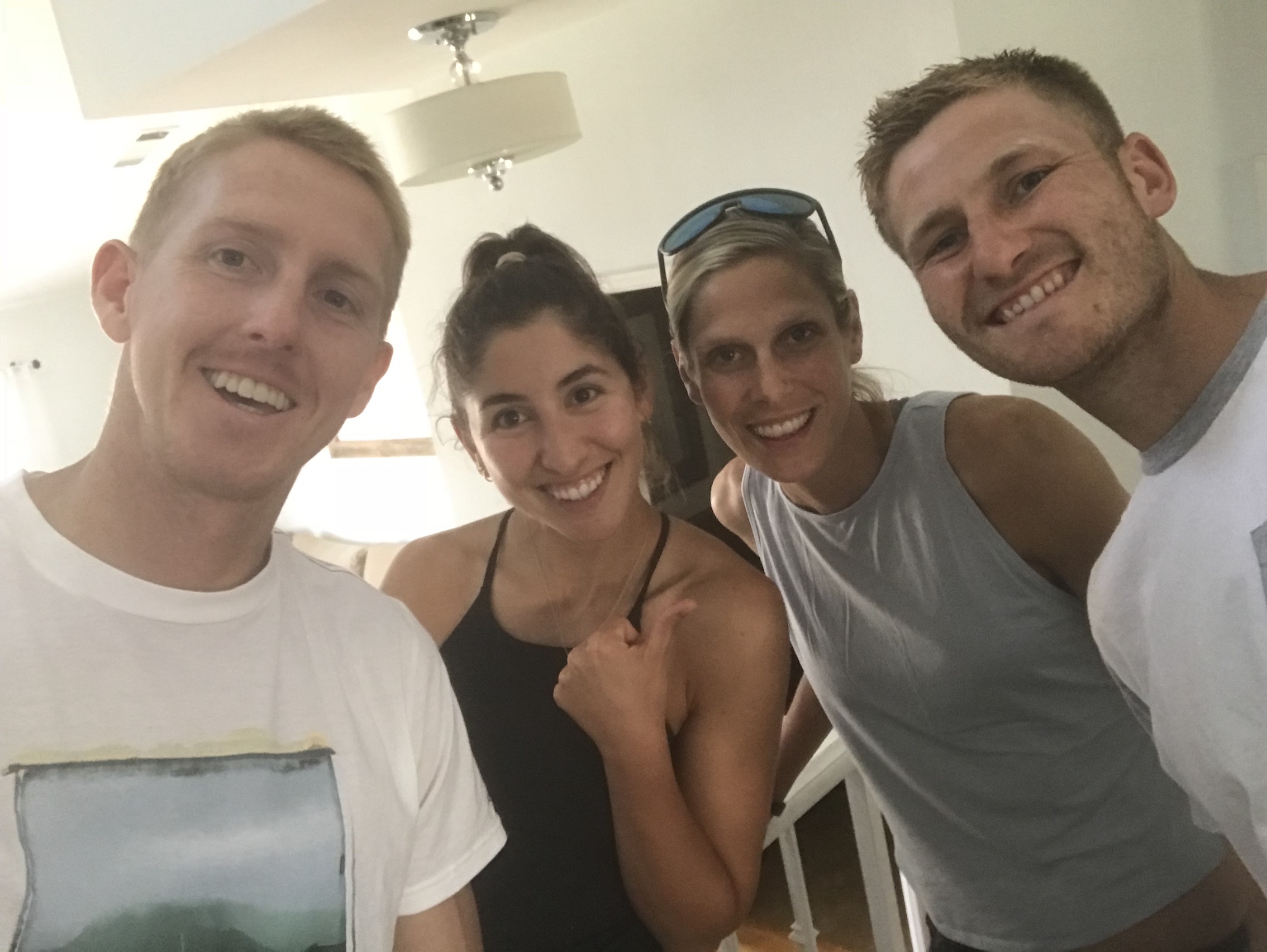
Wednesday Jun 20, 2018
Wednesday Jun 20, 2018
The pause, so slight, so innocuous, but present nonetheless, said more than words could. And, to be fair, Melissa Humana-Paredes did put a nice verbal spin on her and Sarah Pavan’s quarterfinal loss against Brooke Sweat and Summer Ross in Fort Lauderdale earlier in the year.
She called it thrilling.
“But…” and then came the pause, ever so brief, just enough to know that a fifth place for Canada’s top team, even in an FIVB Major, even in the first big event of the year, is nowhere near this team’s expectation. And justifiably so.
In their previous six international tournaments, their worst finish had been fourth, in a run that included a silver in Poland, bronze in one of the top events of the year in Gstaad, and a gold in Porec.
“I can tell you guys are cringing about it,” Tri Bourne said on SANDCAST: Beach Volleyball with Tri Bourne and Travis Mewhirter.
“We don’t want people to think ‘Oh, fifth, terrible,’” Pavan said. “Like, for all intents and purposes, it is a good finish but our goal is to be in the semifinals or on the podium every tournament, because that means we are playing well. Fifth is not bad, but we have high expectations.”
It hasn’t taken long to build them. This is just the second year of the Pavan-Humana-Paredes partnership, and in that short time they have already raced to the top of the FIVB rankings and finished on a podium in six different countries, three of those podiums resulting in medals of the gold variety.
“We kind of became addicted and wanted it to happen all the time,” Pavan said. “Even though we are in a second year and every team is elevating their level, we still have been able to hold onto that spot. And we still have so many things we want to get better at and that we’re working on and we know that we can still get so much better so we’re excited about that. The first year was about laying the foundation, now it’s time to find our identity as a team.”
As it goes in a search for identity, and switching sides, and switching partners, there are inevitable stumbles along the way. And as it goes with exceptional, world-class athletes, sometimes those stumbles, such as a fifth place in one of the biggest events of the year, are to most accomplishments.
And, of course, sometimes those stumbles may seem more obvious, such as their upset at the hands of Delaney Knudsen and Jessica Sykora in the AVP New York qualifier a week ago.
“We’re having some ebbs and flows,” Pavan said, as Humana-Paredes laughed in the background. “Some ups and downs, which I think is normal in the second year of a partnership. We are having moments where we are playing great and amazing and we are having moments where we finished the game wondering ‘What the heck just happened? What were we doing?’
“Obviously, we always want to win. We all do. But I’m glad it’s happening now because we do have time to work out those kinks and have those hard conversations because we’re always learning and always looking at the opportunities in front of us. So yeah, it’s been a little up and down but heading into this next phase of the season, we’re looking to get our feet under us and make some big strides.”
Those strides will, however, be taking place exclusively on the FIVB, and no longer on the AVP. According to Pavan, due to a new rule instated by the USAV, unless the AVP, or any domestic tour, pays a fee to the USAV for each event featuring international players, said international players will not be permitted to play on the AVP Tour.
“This has never been a rule before,” Pavan confirmed. “So yeah, Mel and I talked about it and if we were in the AVP’s position, we would find it hard to reason paying that much money too.”
Twelve hours prior to New York, Pavan and Humana-Paredes didn’t know if they were even allowed to play. So they missed their initial flight from Canada to New York because they weren’t sure. Then they moved it back and missed their next for the same reason.
Then they got the OK from the AVP. They were good to go.
So they woke up at 3 a.m., jumped on a plane at 6, landed at 8, rolled into Manhattan at 9, snuck in a quick nap, grabbed some oatmeal, jumped onto the court and attempted to play the world-class volleyball they were accustomed and expected to play.
“We’re not going to make excuses,” Humana-Paredes said. “Those qualifiers are deadly. They are crazy. We had three games within a span of three or four hours, which I haven’t done since youth. It was definitely a challenge, both physically and mentally.”
Indeed. Physically, they – somewhat hilariously – may have mixed up creatine and electrolytes. Mentally, they were playing a brutal qualifier with no sleep, little food, no warm ups – and with a freeze rule Humana-Paredes had never experienced before.
And though the loss is fresh, and it is not difficult to see the disappointment, they cannot help but laugh a bit at the mania of it all, from the missed flights to the quick nap to the accidental nutritional mishap.
“It was definitely not our finest,” Humana-Paredes said. “It was really unfortunate because it was my first AVP, you’re on Pier 25, you can see the Freedom Tower in the background – gorgeous, it’s just beautiful. You wanted to soak it all in and get the whole AVP experience. We were bummed we couldn’t get to do all of that.”
They’re bummed with fifths. They’re bummed they can no longer play on the AVP.
But they’re infectiously excited about what the future has in store for their nascent yet impressively successful partnership. They’re excited about Olympic qualification, which begins as early as this fall. They’re excited about a three-week FIVB trip beginning next week in Poland. They’re excited for events in Vienna and Gstaad and Germany.
"We're still learning so much," Humana-Paredes said. "That's comforting for us and exciting for us because we have so much more that we need to improve on and that we can improve on and I think our potential -- it seems limitless right now."


